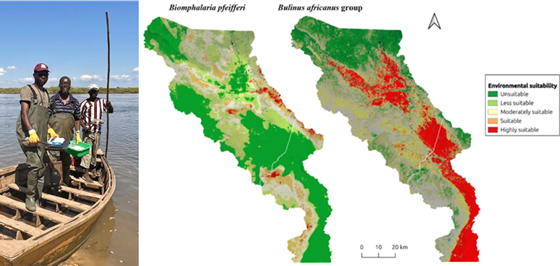
As our collaborative work with HUGS and Shire_vec projects comes to a close, we shine a spotlight on the achievements of two key staff members, Mr Clinton Nkolokosa and Mr Peter Makaula.
Over the last five years, Clinton and Peter have each had significant roles in fieldwork and have helped to reinvigorate the importance of medical malacology, the scientific study of snails that transmit parasites causing human disease, in Malawi.
As part of his Wellcome Trust MSc Training Fellowship, Clinton first completed his taught MSc in Geographical Information Systems (GIS) at Sheffield Hallam University in 2022. His research dissertation formed the basis of a seminal study published in Environmental Monitoring and Assessment entitled, “Monitoring and simulating landscape changes: how do long-term changes in land use and long-term average climate affect regional biophysical conditions in southern Malawi?”
This honed his subsequent interest in exploring the epidemiology of snail-borne diseases in the Lower Shire River Valley (LSRV), as his Training Fellowship also provided research funds for a period of 18 months. This later synergised with the field operations of the HUGS and Shire_vec projects. Clinton’s specific project was also based at MLW, coined “SCHISTO-ENV: Measuring the impact of past, present and future environmental changes on schistosomiasis transmission in southern Malawi”.
The remit of his research in SCHISTO-ENV was ambitious, requiring a significant portion of time and effort to visit, collect and then identify freshwater snails within the LSRV. To do so, teamwork was essential and Clinton made good use of the on-the-ground knowledge and experience of several HUGS and Shire_vec staff.
Essential in this fieldwork was Mr Peter Makaula, a retired environmental health officer from Mangochi District and a well-known national expert in the surveillance and control of schistosomiasis. Fortunately, Peter had recently joined the HUGS team and welcomed every opportunity to don a pair of chest waders and collect snails with Clinton.
After visiting 70 representative freshwater habitats and carefully documenting the presence and absence of snails, as well as recording key water parameters, for example conductivity and pH, Clinton was able to model this information. Using advanced geostatistical methods, he then predicted the environmental ranges and suitable habitats for two important intermediate snail hosts, the Bulinus africanus group and Biomphalaria pfeifferi. The former is responsible for transmission of urogenital schistosomiasis, while the latter is responsible for transmission of intestinal schistosomiasis.
The output of this collective effort has now been published in Parasites and Vectors, entitled “Predicting current habitat suitability for intermediate snail hosts of urogenital and intestinal schistosomiasis in the Lower Shire Valley floodplain of southern Malawi.” This is groundbreaking work in medical malacology, providing essential snail distribution maps that help further our understanding of the epidemiology and control of both urogenital and intestinal schistosomiasis.
It is now very clear that the ecological requirements of the Bulinus africanus group are quite different, being much less restrictive than Biomphalaria, allowing these snails to be more widely dispersed. With current resources, for example, future transmission control of urogenital schistosomiasis may not be possible, as these snails are simply too pervasive, whereas transmission control of intestinal schistosomiasis may be within future possibilities if interventions are managed effectively and targeted appropriately.
After completing his MSc, Clinton was honoured by the Royal Geographical Society (with Institute of British Geographers) with the Best Postgraduate Dissertation Prize in GIS. In early 2025, he enrolled for a PhD at the University of Strathclyde, funded by the prestigious Commonwealth Scholarship Commission in the UK. Now based in the Biological and Environmental Sciences Department, Clinton continues to develop his expertise in geospatial modelling.
At the same time, Peter has been developing his own PhD interests. He is soon to submit a thesis by publication on the control of schistosomiasis, to be examined at LSTM before the close of this year.
The HUGS and Shire_vec teams thank them for their tremendous teamwork, significant achievements and valued friendships, wishing them both continued success in their forthcoming PhD examinations and beyond.